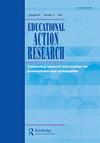编辑
IF 1.2
Q3 EDUCATION & EDUCATIONAL RESEARCH
引用次数: 0
摘要
这期杂志中丰富的研究和讨论显示了该杂志及其读者的国际性和跨学科性质,这确实非常受欢迎。它包括来自学校教育、教师教育、高等教育、多服务性质的难民工作和国际合作的文章。有本科生研究监督(Van Krieken Robson),教师教育(Woodrow and Lasser;Mark & Id-Deen;Cronin, Cook, Flattery, Griffiths & Rodrigues),在城市环境中与难民儿童的跨学科工作(Kervick, Haines, Green, Reyes, Shepherd, Moore, Healy & Gordon),学校教育方面(伊朗的男女同校班,Nazari & Hashemi),国际合作和知识民主(Meredith & QuirozNiño),第二语言课堂的形成性评估(De Neve, Leroy, Struyven & Smits);以及早期儿童研究(Van Krieken Robson)。也有关于不同类型的伙伴关系的研究——在城市教育环境中的跨学科实践(Kervick等人),在国际学术合作(Meredith & Quiroz-Niño)和教师教育(Cronin等人)。这些丰富的研究促使我重新思考行动研究的目的、目标和语言。我生活的世界和教育领域关注的是有效性和效率,以及平等和正义;生活在贫困中的人和非贫困人群的成果差距越来越大;带来了我一生中从未见过的社会和政治规模的变化。因此,重新思考核心价值和主要目的并不奇怪。本期的文章帮助我做到了这一点。教育中的行动研究:一组案例研究?M.J. Saez Bondia和A.L. Cortes Gracia的著作是对行动研究和案例研究这两个高度相关概念的关键思考和定义工作的一次非常有用的回顾。作者对活动的目的和参数的历史和讨论进行了重新整理,特别强调了这两个领域的教育目的。它在很多方面都很有价值:提醒我们早期那些采用或倡导这些方法的人真正重要的因素;思考它们的应用和局限性;考虑到它们相互嵌套的力量和潜力。在我看来,需要重申的是,在早期的行动研究思维中,对正义和改善年轻人结果的承诺。它刷新了思维,提出了有用的问题和观察。在一个大部分教育和护理语言都采用经济词汇并强调效率方面的结果的世界里,重要的是要提醒那些像Somekh和Zeichner这样的人,他们认为,在教育背景下的行动研究中,“行动研究的典型反思过程应该允许[我们]深化所研究的情况,以获得更多的社会公正和富有成效的结果”(Saez Bondia和Cortes Gracia)。在这个问题上,有很多研究和研究的例子。第二篇进一步强化核心思想的文章是詹妮弗·范·克里肯·罗布森(Jennifer Van Krieken Robson)的《行动研究探究:通过小组监督促进幼儿研究本科研究者的发展》。这是《教育行动研究2022》第30卷第1期。5,687 - 688 https://doi.org/10.1080/09650792.2022.2134533本文章由计算机程序翻译,如有差异,请以英文原文为准。
Editorial
The rich set of studies and discussions in this issue shows the international and interdisciplinary nature of the journal and its readership, which is very welcome indeed. It includes articles from school education, teacher education, higher education, refugee work of a multi service nature, and from international collaborations. There are studies of undergraduate research supervision (Van Krieken Robson), teacher education (Woodrow and Lasser; Mark & Id-Deen; Cronin, Cook, Flattery, Griffiths & Rodrigues), interdisciplinary work with refugee children in an urban setting (Kervick, Haines, Green, Reyes, Shepherd, Moore, Healy & Gordon), aspects of school education (a coeducational class in Iran, Nazari & Hashemi), international collaborations and knowledge democracy (Meredith & QuirozNiño), formative assessment in a second language classroom (De Neve, Leroy, Struyven & Smits); and early childhood studies (Van Krieken Robson). There are also studies of partnerships of different kinds – in interdisciplinary practice in urban educational settings (Kervick et al.), in international academic collaborations (Meredith & Quiroz-Niño) and in teacher education (Cronin et al.). This wealth of studies sparked me to return to thinking about the purposes, aims, and language of action research. I live in a world and an educational field that is concerned with effectiveness and efficiency, as well as equality and justice; with a growing gap between the outcomes of those who live with and in poverty and those who do not; with change on a social and political scale that I have never witnessed in my lifetime. Therefore, a return to thinking about core values and prime purposes is not necessarily surprising. The articles in this issue helped me to do this. ‘Action research in education: a set of case studies?’ by M.J. Saez Bondia and A.L. Cortes Gracia was a really useful revisiting of key thinking and definitional work on the two highly interrelated concepts of action research and case study. The authors rework the history and discussions on the purposes and parameters of the activity, with particular emphasis on the educational purposes of these two areas. It is valuable in many ways: reminding us of the elements that really mattered to those adopting or advocating these approaches in earlier times; thinking about their applications and limitations; and considering the power and potential of nesting them within each other. To be reminded about the commitment in earlier action research thinking to justice and improved outcomes for young people stays with me as something in need of restatement. It refreshes the thinking and raises useful questions and observations. In a world where much of the language of education and care has taken on economic vocabulary and emphasises outcomes in efficiency terms, it is important to be reminded that those such as Somekh and Zeichner have argued that, in action research in educational contexts, ‘the reflective process typical of action research should allow [us] to deepen the studied situations to obtain more socially just and productive outcomes’ (Saez Bondia & Cortes Gracia). There are many examples of studies and research aiming to do that in this issue. The second article that prompted further reinforcement of core ideas was ‘An action research inquiry: facilitating early childhood studies undergraduate researcher development through group supervision’ by Jennifer Van Krieken Robson. It is a suitably focused EDUCATIONAL ACTION RESEARCH 2022, VOL. 30, NO. 5, 687–688 https://doi.org/10.1080/09650792.2022.2134533
求助全文
通过发布文献求助,成功后即可免费获取论文全文。
去求助
来源期刊

Educational Action Research
EDUCATION & EDUCATIONAL RESEARCH-
CiteScore
3.10
自引率
8.30%
发文量
48
期刊介绍:
Educational Action Research is concerned with exploring the dialogue between research and practice in educational settings. The considerable increase in interest in action research in recent years has been accompanied by the development of a number of different approaches: for example, to promote reflective practice; professional development; empowerment; understanding of tacit professional knowledge; curriculum development; individual, institutional and community change; and development of democratic management and administration. Proponents of all these share the common aim of ending the dislocation of research from practice, an aim which links them with those involved in participatory research and action inquiry. This journal publishes accounts of a range of action research and related studies, in education and across the professions, with the aim of making their outcomes widely available and exemplifying the variety of possible styles of reporting. It aims to establish and maintain a review of the literature of action research. It also provides a forum for dialogue on the methodological and epistemological issues, enabling different approaches to be subjected to critical reflection and analysis. The impetus for Educational Action Research came from CARN, the Collaborative Action Research Network, and since its foundation in 1992, EAR has been important in extending and strengthening this international network.
 求助内容:
求助内容: 应助结果提醒方式:
应助结果提醒方式:


